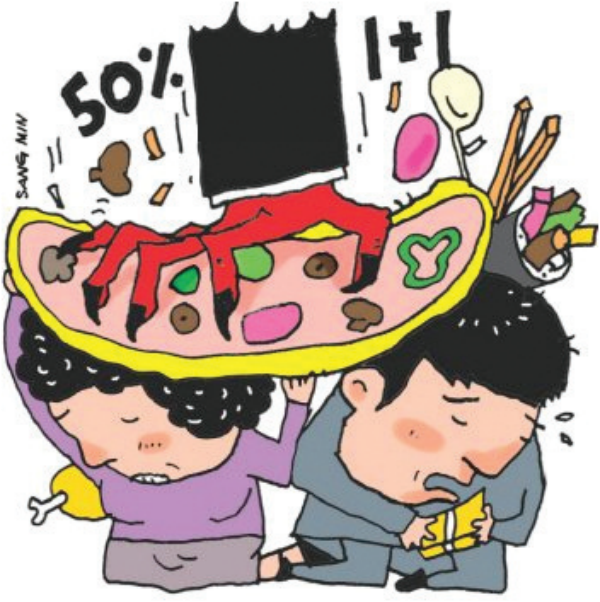Not long ago, there was a huge wave of public anger due to revelations that the founder of Mr. Pizza and the former chairman of MP Group, Jeong Woo-Hyeon, and his family members had abused their power over their franchisees, and this abuse of power is referred to as Gapjil in Korean. Moreover, starting with Mr. Pizza, many franchisors such as Bachelor’s Vegetable Shops turned out to have been corrupt, and franchisors’ practice of overusing power became socially controversial. As the Korean franchise market occupies a large portion of the restaurant sector and has a huge impact on our economy, it is also believed that it will be good for Kingos to be aware of this issue. The Sungkyun Times (SKT) looks at what franchises are, the examples of Gapjil, and the way forward for the sound development of franchises.
Korean Franchise Market
Influence of Franchises in Korea
Franchising is a system in which manufacturers or sellers receive payment by providing retail shops with the right to use their trademarks, products, and technologies. According to the enrolled disclosure documents of Fair Trade Commision on 2014, the total number of employees in all franchisors is 174,000, the total number of franchisees is 210,000, and about 2.4 million people earn their living through franchises, including merchants and the merchant’s dependents. In addition, a large number of suppliers to franchises such as small businesses supplying food or raw materials, IT enterprises, are doing business and keeping jobs through franchise business. According to the Fair Trade Commission, the number of franchisors was 1,505 in 2009, but increased to 2,971 in 2013, and the number of brands increased from 1,901 to 3,691, almost doubling in four years. Furthermore, sales of the relevant markets are continuously increasing after breaking through the 40 trillion mark in 2012.
Reasons Why There are Many Franchisees in Korea
There are three reasons that franchise markets are expanding despite the disadvantages of being a franchisee. The first one is the preference of popular brands among domestic consumers. The Korea Chamber of Commerce and Industry surveyed 1,000 consumers about the consumer awareness and usage of franchisees. 79.4% of the respondents replied that they have more positive recognition of franchises than with individual businesses. The second reason is the high brand loyalty of consumers to franchisors. This is because when consumers are satisfied with their purchases from franchises, they are highly likely to choose the same brand despite various marketing activities of different brands. The third reason is an increase in demand for opening franchisor restaurants, utilizing the expertise of the franchisors. As the Korea’s traditional concept of having a lifetime job is weakening, people have started to consider a start-up as an alternative. This phenomenon contributed to both a quantitative and qualitative expansion of the franchise industry.
Gapjil Franchisors
Definition of Gapjil
Gapjil is a word that refers to unfair behavior toward the weak in the relationship between the upper and lower position. Franchisors making undue profits from franchisees that are in a relatively weak position such as with gapjil have become socially controversial.
Types of Gapjil
① Undue Shifting of Advertising, Promotion, and Discount Costs

The franchisee pays 3 to 4% of the sales to franchisors for the royalty and advertising expenses, but the owner does not know how franchisors use the payment. For example, chicken franchisor ‘A’ demands that franchisees pay 2,000 per bag for advertising fees that has nothing to do with the advertisement itself . Even when franchisees give a discount due to the loss of sales because of gapjil by the franchisor, the franchisees should bear the expenses.
② Interior Cost Overruns
According to the Survey of Actual Status of Franchisees Interior, a report from the Seoul Economic Promotion Agency, the franchisee’s construction costs charged by the designated enterprise by the franchisor was approximately 30.9 million per 3.3 ㎡, while the construction cost for the enterprise found by the franchisee itself was approximately 17.4 million, showing a 43.7% difference between the two costs. Franchisee ‘A’ paid 102.5 million for the interior construction, but the franchisor only paid 41 million to the construction company and took 61.5 million profit. Franchisors order unlicensed construction for the sake of interior design and construction, and force the franchisee to update the interior once every few years to make undue profits.
③ Compulsion to Purchase Expensive Franchisor’s Industrial Products
It was also revealed that one franchisor sold rice for 46,500 to franchisees, which was 35,000 per 20kg in the market, meaning that it was sold at about a 30% more expensive price. Additionally, some franchisors forced franchisees to purchase goods such as cooking oil, sugar, liquors, beverages, and canned vegetables from the franchisor. Therefore, franchisees were forced to pay more than 1 million per month for these products to the franchisors.
④ Nondisclosure of Franchise Information
Recently, the owner of ‘H’ chicken franchisor was blamed for a sexual harassment scandal. It caused the sales to decrease, so the franchisees faced a huge financial loss. Though ‘H’ chicken franchisor is a large franchise with annual sales of around 570 billion, the owner is an individual business operator. Therefore, the owner did not open the balance sheet and profit statement including that of margin and sales, which is the information that franchisees should know about.
⑤ Raw Deal and Unfair Contracts
If the franchisees buy products of the same quality instead of purchasing the products that the franchisors provide for, the franchisors visit the store in the name of sanitary inspection. Franchisors even threaten franchisees not to renew contracts through warning signs or certification of contents. If franchisees terminate the contract with the franchisor, the franchisors block the franchisee’s owner from opening another private business in the same place. Franchisors open the same type of franchise business near the owner’s private business, and they use every trick to interrupt private business. There are even some cases where the franchisors sue franchisees for violating a trade secret and trademark.
These five types of gapjil are the most typical ways that franchisors make unreasonably excessive profits from franchisees. There are, however, more various cases. The two examples below are the representative gapijl cases recently.
Mr. Pizza and Bachelor’s Vegetable Shops

The first example is Korean representative pizza brand, Mr. Pizza. The chairman Mr. Jeong’s representative method of overusing power is to impose a ‘cheese duty,’ which means that franchisees should pay more money when buying cheese because of unwanted distribution process. The franchisor added two companies that did not play any role in the transaction, adding cheese prices to the top, and shifted the burden onto the franchisees. One company was owned by Jeong’s younger brother’s company which was just a paper company, meaning it wasn’t technically an operating company. Jeong also sought revenge after Mr. Pizza franchisees withdrew because of gapjil and founded a ‘pizza union.’ Jeong and MP Group constantly monitored the franchisees for the operation of their restaurants, and reported on the condition of the openings, daily sales, and the number of customers. MP Group opened direct management stores 60 meters and 150 meters away from the ‘pizza union’ restaurants, and sold pizza with lower prices. They also pressured food supplier enterprises to cut off the food that went to the ‘pizza union’ restaurant. He wanted to show a model whereby the franchisees would eventually fail if they protested to the franchisor and withdrew their contracts.

Another example is the case of Bachelor’s Vegetable Shops which is a franchisor selling fruit and vegetables. The representative of the company verbally abused staff, used violence and demanded bribes. The chairman, Mr. Lee, demanded a scooter in the group chatroom to franchisees. He also hurled abuse at the employees when they had a meeting. Unlike regular franchise chains, Bachelor’s Vegetable Shops select the owners of franchisees from among the franchisor’s employees. They have a system whereby the franchisor gives the monthly deposit, premium and interior expenses to young employees who do not have enough money to open a store, and the franchisees repay the loan after they become profitable. This is an easy way for franchisees to be placed in the weak position where they cannot go against the franchisors’ will.
Ways Forward for Franchises
To solve these problems, partnerships without gapjil are most important. Franchises in other countries have win-win structures for both the franchisors and franchisees. Before opening up a franchise, the franchisor analyzes the location, surrounding business district, and floating population. Then, when there is a possibility of success, the franchisor allows the franchisee to open. Therefore, the franchisee has a low possibility of failure. Korean franchisors are allowing the franchisees to open without much planning and the franchisor receives the benefits even if the franchisee fails. A good example of the win-win structure abroad is the case of the ‘purchase co-operatives’ of Dunkin’ Donuts in the United States (US). As a result of a series of oil crises in the 1970s and thereafter, the US franchise industry encountered a crisis because the price of raw materials skyrocketed. At that time, franchisors and franchisees formed a cooperative association, buying and purchasing goods directly. The result was very successful. Cooperative association has bought materials together, and they could reduce the cost. These types of associations have spread to representative brands of the US such as McDonald’s, Burger King, and KFC.
Secondly, the relative law should be revised, so that if the franchisees are damaged due to a franchisor’s unfair corporate practices, the contract can be canceled and the franchisees’ damage can be paid by franchisors. Fortunately, the amendment of punitive damages which was passed by the National Assembly will not be practiced until October. Therefore, compensation will be paid up to three times of the total financial damage incurred by the franchisor’s illegal actions.
Third, the franchise industry should make this situation a starting point to develop a way to promote the franchise industry instead of ‘killing the franchises’ that hinders the development of the industry. It is not desirable to weaken the whole franchise industry which has a powerful influence on the public’s lives by only considering some of the biggest franchises’ problems and generalizing those problems as that of whole franchisees. Attacking the franchisor with a problem can directly damage the innocent franchisees since it can lead to the hatred toward the whole brand.

It is sad to realize the abuse of power by franchisors which were once known as models of success stories. It is optimistic to think, however, that many people would be now well aware of the problems of gapjil and are trying to revise the issue. The issue should be checked based on the exact understanding of the status of the industry. Moreover, various experts including scholars, policymakers, franchisors and franchisees should cooperate and share their opinions to look for solutions with a mid-term and long-term view that grasps the changing trends of Korea’s massive franchise industry.
